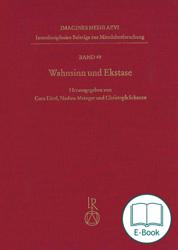›Wahnsinn‹ (insanity) is an enigmatic term with a huge variety of meanings. This variety ranges from labelling mental illnesses or behaviour which is incomprehensible, unreliable or dangerous, to positive attributes (»wahnsinnig gut« i.e. »extremely great«). In case studies, this volume examines the pre-history of ›Wahnsinn‹ before the age of reason (»Zeitalter der Vernunft«, Foucault). It does so by looking at how texts from the Christian Ancient World and the Middle Ages stage abnormal behavior which can be traced back to perception disorder or mental disorientation, or how this behavior is attributed to certain characters. Thus, the prime focus of this examination tackles the question how ›Wahnsinn‹ is functionalised, and also analyses the role which is played by the socio-cultural backgrounds as well as the philosophical and theological context, and the context of medical history.
This volume deals with the ancient and medieval ›pre-history‹ of an enigmatic term which is used in a variety of contexts: ›Wahnsinn‹ (insanity/craziness/folly), or particularly the respective adjective ›wahnsinnig‹ (insane/crazy/foolish) which is used almost ubiquitously, both have a variety of meanings. This variety ranges from labelling mental illnesses or behaviour which is incomprehensible, unreliable or dangerous, to positive attributes (»wahnsinnig gut« i.e. »extremely great«). In order for the humanities or cultural studies to examine ›Wahnsinn‹, Michel Foucault’s pioneering study Folie et déraison. Histoire de la folie à l’âge classique (1961) constitutes a central starting point. What is primarily important here, is Foucault’s explicit classification of the ›normal‹ and the ›other‹. However, Foucault pays little attention to how ›Wahnsinn‹ is attributed to persons and does not consider the role played by literature and science or by the arts. Furthermore, due to its various forms of appearance, ›Wahnsinn‹ has to be regarded in binary relation to reason. After all, different discourses on ›Wahnsinn‹ have been shaping the culture of the Occident since way before the Enlightenment. This is shown in a decidedly interdisciplinary access offered by the essays in this volume, which is based on the platonic term mania. The term’s advantage is that it does not have a sole negative connotation; thus, it includes other forms of ›being beside oneself‹ (ekstasis), for example divine inspiration, apart from abnormal mental disorders. In case studies, the contributions in this volume examine how texts from the Christian Ancient World and the Middle Ages stage abnormal behavior which can be traced back to perception disorder or mental disorientation, or how this behavior is attributed to certain persons. Thus, the prime focus of this examination tackles the question how ›Wahnsinn‹ is instrumentalised, and also analyses the role which is played by the socio-cultural backgrounds as well as the philosophical and theological context, and the context of medical history. The spectrum ranges from approaches which have been ignoring medical implications, to those which are being mixed with divine or demonological explanatory attempts by medical-dietary knowledge. It also focuses on those approaches which completely do without a demonological explanation for ›Wahnsinn‹ or ekstasis, and simply focus on outside impulses and physical factors in order to diagnose or treat different forms of ›Wahnsinn‹.
Cora Dietl (geb. 1967) ist seit 2007 Professorin für deutsche Literaturgeschichte (Mittelalter/Frühe Neuzeit) an der Universität Gießen. Promotion Tübingen 1995 mit einer Arbeit zum späthöfischen Roman, Habilitation Tübingen 2004 zum frühhumanistischen Drama. Forschungsschwerpunkte: höfische Epik, deutsche Theatergeschichte der Frühen Neuzeit, Regionalliteratur des Mittelalters.
Nadine Metzger (geb. 1981) ist Alt- und Medizinhistorikerin, seit 2009 wiss. Mitarbeiterin am Institut für Geschichte und Ethik der Medizin an der FAU Erlangen-Nürnberg. Forschungsschwerpunkte: Antike Medizin und Psychopathologie, dämonologische vs. medizinische Krankheitserklärung. Medizinhistorische Habilitation 2020 zur Medizintheorie der 1910er und 1920er Jahre.
Christoph Schanze (geb. 1982), Studium Deutsch und Musik in Tübingen und Trossingen, seit 2010 wiss. Mitarbeiter in Gießen, Promotion 2015 mit einer Arbeit zum Welschen Gast Thomasins von Zerklære. Forschungsschwerpunkte: didaktische Literatur des hohen und späten Mittelalters / ‚Wissensliteratur‘, Minnelyrik, Sangspruchdichtung, Lied um 1500, höfischer Roman (Ästhetik und Poetologie), Dinge und Literatur
This series, which will comprise doctoral and professorial dissertations and other monographs as well as collective volumes, aims at highlighting and promoting interdisciplinarity in Medieval Studies even more than is currently the case. Works from all branches of Medieval Studies will be accepted, provided they emphasise the aspect of interdisciplinarity, i.e. they attempt to transgress the boundaries of any single subject.


 Table of Contents
Table of Contents